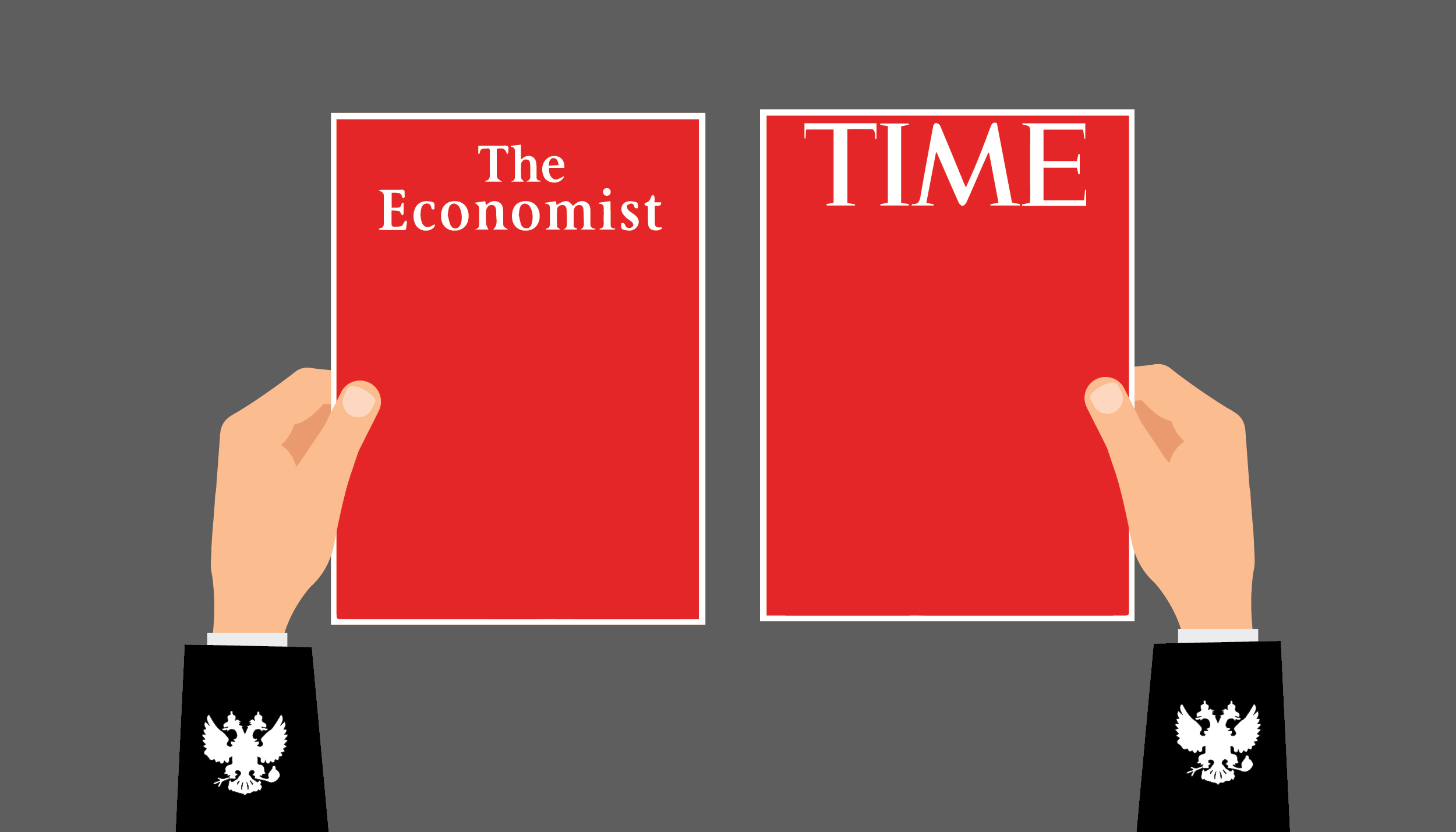Українською читайте тут.
On October 30, 2023, the American magazine Time dedicated the cover of its new issue and an article to President Zelensky. “‘Nobody Believes in Our Victory Like I Do.’ Inside Volodymyr Zelensky’s Struggle to Keep Ukraine in the Fight,” the magazine's cover reads. Journalist Simon Schuster writes that the Ukrainian president "feels betrayed by his Western allies.” In his article, he cited anonymous sources – "member of his circle" – after a visit to the United States in September 2023. According to Shuster, people from Zelenskyy's team are trying to convey that Ukraine is doomed to defeat and that he should not be encouraged to believe in victory. Mykhailo Podolyak, an adviser to the head of the Presidential Office, called the article "a subjective point of view of a particular journalist."
On November 1, 2023, The Economist published an article by the Commander-in-Chief of the Armed Forces of Ukraine, Valerii Zaluzhnyi, and an interview with him. He rarely gives interviews to Western media, so each article creates a great deal of buzz. Zaluzhnyi warned that the war was entering a protracted "positional stage" and that such conditions were playing into Russia's hands. So, he said that Ukraine needs airplanes, drones, electronic warfare equipment, and demining equipment. These materials provoked a flurry of reactions from the agitprop. Let's take a closer look at the key theses of the manipulators.
The propaganda resources did not hide their glee at what they read, saying that if Western media wrote about the failures of the Ukrainian counteroffensive, it had failed. If a Western journalist wrote that President Zelenskyy, according to anonymous sources, had stopped critically perceiving reality. Such a reaction contradicts one of the key Russian manipulations about the "conspiracy" of Western media, which allegedly constantly lies and distorts the picture of the world. Allegedly, a whole "global industry" has been created that continuously produces staged videos, fake photos and videos, and Western social networks and media are allegedly enthusiastically spreading them around the world. At the same time, Russia is "groundlessly" accused of conducting "sophisticated TV propaganda." However, when certain theses of these "hostile" Western media resonate with Russian narratives, agitprop presents the situation in a favorable light: the hated "mouthpieces of the West" become respected and reliable sources.
"Zelenskyy is disconnected from reality, and his entourage speaks according to Putin's 'handbooks'"
In 2023, Simon Shuster plans to publish a book about Volodymyr Zelenskyy, so the publication of the resonant article can be perceived as an attempt to draw public attention to the author's personality on the eve of the publication of his book. From the point of view of journalistic ethics and professional standards, Simon Shuster's article raises many questions, including the anonymity and secrecy of the sources of his "insights," the use of emotionally charged statements that push the reader to subjective conclusions, and the lack of a zoom-out perspective: for example, the real reasons for the slowdown in the Ukrainian counteroffensive were not analyzed. Since all the main "betrayal" goes through the stamp of anonymity, there is a well-founded suspicion of the material. Why is the "truth" so anonymized? Who are these anonyms and how much can we trust them? How can we check whether everything is really as these unnamed sources say?
"Zelenskyy's inner circle has already started talking according to the 'Putin’s handbooks,'" one pro-Russian telegram channel says. "The press service of the Ukrainian president has been exposed to the chaos that reigns in the country's government. There is no trust between him and his entourage," another propaganda outlet summarizes. However, an anonymous statement cannot be verified for authenticity, and it is also impossible to analyze the speaker's motive. Because of the above remarks, it is difficult to trust the thesis that President Zelenskyy is "detached from reality" and does not want to listen to his environment, which "balances" the prospects for ending the war.
"Ukraine has reached a Cronkite moment. Will Zelenskyy recognize this? Or will we remain in the bunker of Zelensky's "misconceptions" (if not physically, then at least psychologically), waiting for the inevitable end?" the anonymous author of the propaganda post asks rhetorically, drawing a parallel to the Vietnam War. In the 1960s, the American journalist Walter Cronkite made a documentary about the Vietnam War and said that it had reached a stalemate and that the only real way out was to negotiate. In this way, agitprop is once again pushing Ukrainians to believe that any further resistance is futile and that the only way to resolve the situation is to surrender territory and comply with Russia's demands.
"Zaluzhnyi's dead-end"
In an article and interview with The Economist, Zaluzhnyi wrote that despite several successful Ukrainian counteroffensives in 2022, the war is gradually turning into a positional war. He emphasized that this is due to the military parity between Ukrainian and Russian forces and that breaking through Russian defense lines will likely be impossible without a significant technological and tactical advantage. However, in his article, Zaluzhnyi does not classify the situation as a complete stalemate. " Just like in the first world war we have reached the level of technology that puts us into a stalemate. There will most likely be no deep and beautiful breakthrough," Zaluzhnyi writes and adds that to break the deadlock, a large-scale technological leap in warfare and a corresponding supply of new (high-tech) weapons from allies are needed.
According to Kurt Volker, the US State Department's Special Representative for Ukraine in 2017-2019, Ukraine is conducting a counteroffensive "with one hand tied behind its back": no air superiority, no long-range munitions, and insufficient ammunition stocks. In other words, while the West was afraid of escalation, Russia was fighting with all possible methods (except perhaps nuclear weapons).
Zaluzhnyi's article and interview in the Economist seem to be a continuation of the theme raised in Time magazine. The reaction to Zaluzhnyi's rhetoric is even more manipulative than Zelensky's. Agitprop seized on the phrase "deadlock" and manipulated it in every possible way. Russian presidential spokesman Dmitry Peskov accused Kyiv of saying that, perhaps from Ukraine's perspective, the counteroffensive had "stalled," while from Moscow's perspective, "it has not reached a dead end. Russia has consistently continued to conduct a special military operation. All the goals that were set must be achieved." "The Commander-in-Chief of the Armed Forces of Ukraine admitted that the Ukrainian Nazis cannot break through the Russian defense, although a few months ago he was beating his heel in his chest and promising to reach almost to Crimea," one of the pro-Kremlin telegram channels spreading pro-Kremlin rhetoric said. "The Russian (Soviet) military school has outplayed the NATO governance model," others triumphed.
Despite the claims of a "deadlock," the struggle of attrition will continue until one side gains an advantage. Zaluzhnyi warns that if Ukraine does not receive the necessary weapons, it will increase the enemy's chances of winning. "To break this deadlock, we need something new, like gunpowder, which was invented by the Chinese and with which we still kill each other," Zaluzhnyi assures. Ukraine has a better chance of being the first to break the deadlock. Kyiv can rely on military assistance from its allies, which are the most developed economies in the world, as opposed to Moscow's much less technologically advanced allies, such as North Korea or Iran.
Agitprop resorts to "selective truth," highlighting the points favorable to its main narrative, while hiding inconvenient facts. In particular, Zaluzhnyi wrote that Russia lost at least 150,000 people in the war, the life of a Russian soldier is of no value to the Kremlin, and Putin's reference point is World War I and World War II, in which Russia lost tens of millions. In addition, the propagandists are silent about the fact that the Russian air force suffered huge losses, as, according to Zaluzhnyi, Ukraine destroyed more than half a thousand enemy air defense systems. Describing the situation near Avdiivka, the Commander-in-Chief said: " On our monitor screens the day I was there we saw 140 Russian machines ablaze—destroyed within four hours of coming within firing range of our artillery." But this quote did not make it into propaganda sources because it is an inconvenient truth that undermines the thesis of the success of the Russian offensive.
The Time article is based on dubious premises, prejudices, and subjective conclusions. In contrast, Zaluzhnyi's column and interview are a sober analysis of the situation and a warning about an undesirable scenario for Ukraine if Western partners do not take appropriate measures. Therefore, the very attitude and one series of these publications as evidence of Ukraine's "loss" is a propaganda manipulation. The article by the Commander-in-Chief demonstrates that Ukraine's military leadership has a well-founded and clear strategic vision of how the fighting should proceed. This can be interpreted as a message to the West to coordinate strategies before the crucial vote on further assistance to Ukraine in the US Congress. Recently, the US Republicans sent a letter to US President Joe Biden calling on him to provide Congress with a realistic strategy for victory, an ultimate goal. The Republicans wrote that they are ready to support Ukraine if a sober assessment of the situation and a realistic strategy are provided. “Simply stating “we are with you until we prevail” or “we must win” are not win strategies. How does Ukraine prevail and how long is this expected to take? These estimates do not need to be exact, but we should understand the end-state goal and exit criteria," the statement reads. Thus, Zaluzhnyi's publication - a description of the military strategy, possible strategic decisions and calculations on the nomenclature of weapons – is a kind of response to the Republicans' request.



